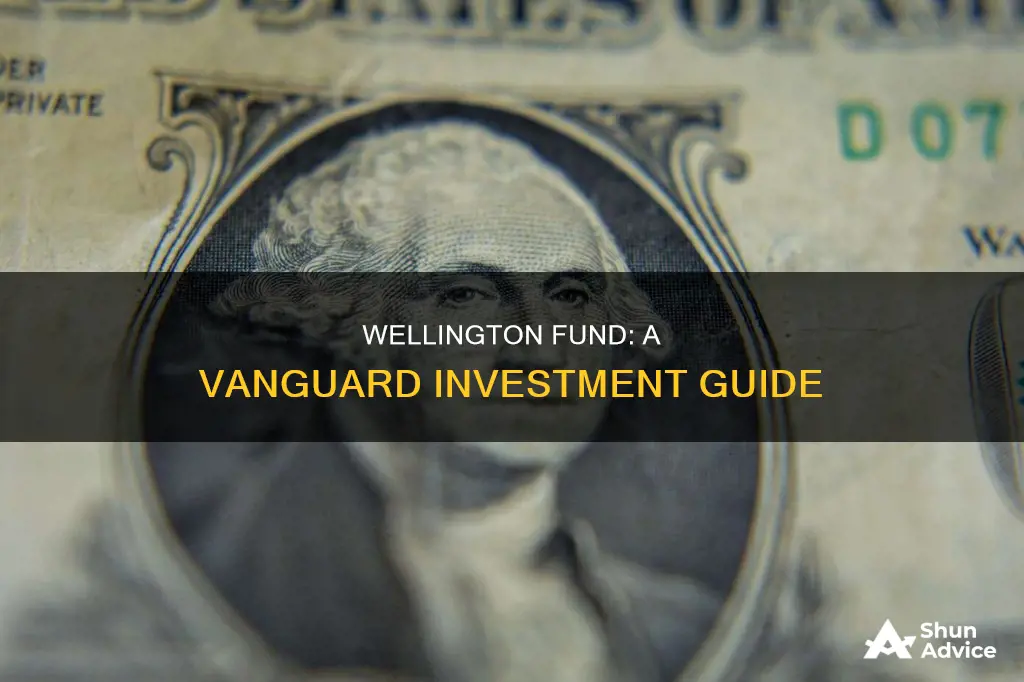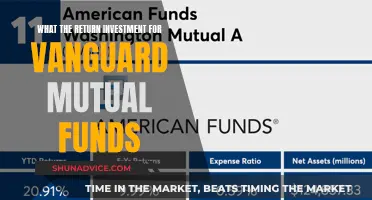
The Vanguard Wellington Fund is a balanced mutual fund that has been in operation since 1929. It is administered by the Vanguard Group and managed by the Wellington Management Company. The fund has a strong performance history and is known for its conservative approach, making it suitable for investors seeking moderate risk and wide diversification. With a focus on stocks, the fund allocates 60-70% of its portfolio to common stocks and the remainder to primary fixed-income instruments, such as bonds. It emphasizes high-quality equity and bond picks, investing in large-cap companies with a consistent history of paying dividends. The fund has a net expense ratio of 0.25-0.26%, significantly lower than the average for its investment category. To start investing in the Vanguard Wellington Fund, a minimum investment of $3,000 is required.
What You'll Learn

Vanguard Wellington Fund's investment philosophy
The Vanguard Wellington Fund is one of the oldest balanced mutual funds in the United States, founded in 1929. The fund is actively managed, with a high focus on stocks, and has consistently delivered strong returns. Vanguard's managers have adhered to a fairly consistent investment strategy over the last 30 years.
The Wellington fund puts equal weight on reasonable current income, capital growth, and capital preservation. The fund focuses on high-profile, dividend-paying companies with strong economic moats whose stocks possess value and growth characteristics. The fund managers practice active management by allocating 60% to 70% of the portfolio to stocks, while the remainder is invested in primary fixed-income instruments like bonds. The fund emphasizes high quality in its equity and bond picks and prefers the stocks of large-cap companies that have a consistent history of paying dividends.
The fixed-income portion of the portfolio is invested heavily in corporate bonds of short, intermediate, and long-term capabilities. More than a third of the total allocation is invested in industrial companies, and a quarter is allocated to financial services companies. The fund also has some exposure to U.S. Treasury, government agency securities, and mortgage-backed securities.
The Wellington fund is well-suited to investors with a long-term time horizon and a focus on growth. Since the fund is heavily invested in stocks, it is important for investors to be able to tolerate volatility. The fund has a moderate level of risk and is broadly diversified to ensure that a bumpy year in one sector does not drag down the overall performance.
Hedge Fund Investment: A Guide for Indians
You may want to see also

Portfolio composition
The Vanguard Wellington Fund is actively managed with a high focus on stocks. As of May 1, 2023, the fund allocated 65.01% of its portfolio to stocks, 34.08% to bonds, and 0.91% to short-term reserves. Its top holdings include Microsoft, Alphabet Class A, Apple, Amazon, and Progressive.
The fund managers practice active management by allocating 60% to 70% of the portfolio to stocks, while the remainder is invested in primary fixed-income instruments like bonds. The fund emphasizes high quality in its equity and bond picks and prefers the stocks of large-cap companies that have a consistent history of paying dividends.
The fixed-income portion of its portfolio is invested heavily in corporate bonds of short, intermediate, and long-term capabilities. More than a third of the total allocation is invested in industrial companies, and a quarter is allocated to financial services companies.
The fixed-income portion also has some exposure to US Treasury, government agency securities, and mortgage-backed securities. More than 90% of the bond holdings are of investment grade, and the average duration stands at seven years, making this fund somewhat sensitive to interest rate changes.
Mutual Funds: Exploring Superior Investment Opportunities
You may want to see also

Investment performance
The Vanguard Wellington Fund has a long history of strong investment performance, dating back to its inception in 1929. As the first balanced mutual fund in the United States, it has consistently delivered competitive returns and has grown to manage over $112 billion in assets.
As of May 1, 2023, the fund had an average annual return of 3% over a one-year period, 7.42% over three years, 7.42% over five years, and 7.97% over ten years. Since its inception, it has averaged 8.23% in annual returns. This consistent performance has earned it a five-star overall rating from Morningstar, including five-star ratings over the three-, five-, and ten-year periods.
The fund's investment strategy focuses on a balanced approach, typically allocating 60% to 70% of its portfolio to stocks and the remainder to fixed-income instruments like bonds. This mix of assets provides a moderate level of risk and broad diversification. The fund has a particular emphasis on high-quality, large-cap companies with a consistent history of paying dividends.
The fund's bond portfolio is primarily invested in high-quality corporate bonds and mortgage-backed securities, with more than 90% of the bond holdings being investment-grade. This approach makes the fund relatively sensitive to interest rate changes, with an average duration of seven years.
The Vanguard Wellington Fund is well-suited for investors with a long-term investment horizon who are focused on growth and can tolerate volatility. It has a strong track record of delivering competitive returns, even during down market environments, making it a top choice for investors seeking a moderate, balanced fund with strong performance.
Protect Your 401k: Invest in Mutual Funds for a Secure Future
You may want to see also

Risk and return analysis
The Vanguard Wellington Fund is a balanced fund, with a greater allocation to stocks than bonds. This asset allocation strategy makes it suitable for investors seeking more growth than income. The fund's performance objective is to achieve capital appreciation and moderate income over time, with a focus on conservation of principal and reasonable income without undue risk.
The fund has a history of strong returns, delivering a 5-year annualised total return of 8.94% and a 3-year annualised total return of 7.42%, placing it in the top third among its category peers. The fund's 10-year average annual return is 7.97%, and it has averaged 8.23% in annual returns since its inception in 1929.
In terms of risk, the fund has a standard deviation of 7.09% over the past three years and 6.66% over the past five years, making it less volatile than its peers. However, it is important to note that the fund lost 32.54% in the most recent bear market, outperforming its peer group by 3.64%. This indicates that the fund could be a better choice than its peers during market downturns.
The fund has a 5-year beta of 0.65, suggesting it will likely be less volatile than the overall market. Additionally, the fund has generated a positive alpha of 0.17 over the past 5 years, indicating that the fund managers are skilled in selecting securities that outperform the benchmark on a risk-adjusted basis.
The fund's expense ratio is 0.25%, significantly lower than the category average of 0.82% or 0.90%, depending on the source. The low expense ratio makes the fund cheaper than its peers. However, investors should note the minimum initial investment requirement of $3,000.
Overall, the Vanguard Wellington Fund offers a balanced approach with a focus on growth and a competitive risk-adjusted return profile. The fund's moderate risk, strong performance, and low fees make it a potentially attractive choice for investors.
Transamerica 401k: Where to Invest Your Funds Wisely
You may want to see also

Costs and fees
The Vanguard Wellington Fund is one of the most inexpensive mutual funds in the moderate allocation category. It has a net expense ratio of 0.25% or 0.26%, which is significantly lower than the average expense ratio of 0.82% or 0.90% for its investment category. The fund has no load fees and comes with an initial investment requirement of $3,000, with each subsequent investment needing to be at least $1.
The fund also offers qualified investors Admiral Shares that have even lower expense ratios but require higher investments. The Vanguard Wellington Fund Investor Shares' consistent history of strong risk-adjusted returns and competent management earned it a five-star overall rating from Morningstar.
In addition to the expense ratio, investors should also consider the costs associated with investing in the fund's underlying assets. The fund allocates 60% to 70% of its portfolio to stocks, with the remainder invested in primary fixed-income instruments like bonds. The fixed-income portion of the portfolio is invested in corporate bonds of varying maturities and government agency securities, among other instruments.
Overall, the Vanguard Wellington Fund has a strong track record of performance and risk management, and its low fees make it a top choice for investors.
Maximizing EIDL Funds: Strategies for Savvy Business Investments
You may want to see also
Frequently asked questions
The Vanguard Wellington Fund requires a minimum investment of $3,000.
The fund puts equal weight on reasonable current income, capital growth, and capital preservation. The fund focuses on high-profile, dividend-paying companies with strong economic moats whose stocks possess value and growth characteristics.
As of May 1, 2023, the Wellington Fund had an average annual return of 3% over a one-year period. For the three-year period, the fund showed an average annual return of 7.42%, and for the five-year period, it had an average annual return of 7.42%. Over 10 years, the fund returned 7.97%. It has averaged 8.23% in annual returns since its inception in 1929.
On a risk scale of one to five, the Vanguard Wellington Fund rates a three. It is a "moderate" and "balanced" fund with a mix of assets: about 65% stocks, 35% bonds, and less than 1% cash. It invests in a wide range of industries, so a bumpy year in one sector is less likely to significantly impact the overall performance.







